Dental Implants – Catonsville, MD
A Permanent Solution to Tooth Loss
Traditional tooth replacement methods have been around for decades and even centuries, but dental implants offer an alternative way to address tooth loss. Dr. Bemani and our team at Advance Dental Clinic are pleased to help if you are missing one, multiple, or an entire arch of teeth. Using titanium posts that mimic your natural tooth roots, these customized and permanent tooth replacements make it easy to enjoy the finer things in life once again. If you're dealing with an incomplete smile and want a solution that will last a lifetime, call us today to schedule a consultation for dental implants in Catonsville!
Why Choose Advance Dental Clinic for Dental Implants?
- Partnered with Local Dental Implant Specialists
- High-Quality, Lifelike Dental Restorations
- Dental Insurance Maximized
What Are Dental Implants?
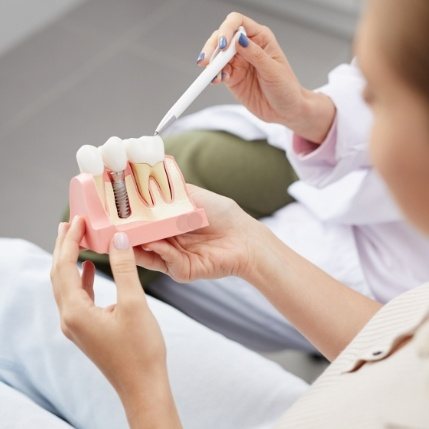
Dental implants are made out of titanium and are biocompatible, meaning they fuse with the jawbone through a process known as osseointegration. Mimicking the look and feel of natural tooth roots, these prosthetics can support a dental crown, bridge, or denture depending on how many teeth you are missing. Offering superior functionality, you can eat your favorite foods and feel confident in your appearance for years to come.
The 4 Step Dental Implant Process
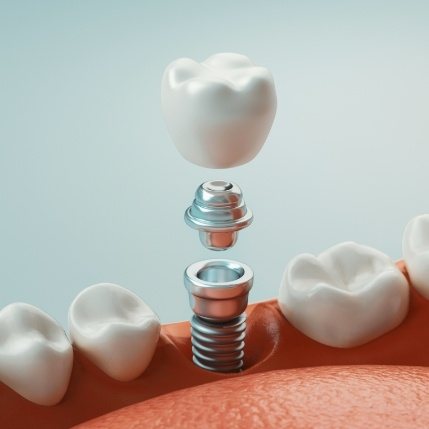
From start to finish, the dental implant process can take several months or longer. That may seem like a long time, but the end results are well worth the effort! Here at Advance Dental Clinic, we partner with local specialists so you can receive top-quality care during every phase of your treatment.
Your journey to a new smile will likely involve four main steps: the initial consultation, your dental implant placement surgery, osseointegration and abutment placement, and restoration.
Initial Dental Implant Consultation

The first step on your path toward your new teeth is a consultation. Dr. Bemani will examine your mouth and learn about your oral health. She may take some scans of your teeth, ask about your lifestyle choices, and ask what your goals are. Armed with that information, she will be able to start putting together a treatment plan. You should also feel free to speak up if you have questions or concerns — it is important to us that you feel confident about the care you are receiving!
Some patients require preparatory procedures before they can get dental implants. For example, you might need tooth extractions, gum disease therapy, or even a bone graft for your jaw.
Dental Implant Surgery

For your dental implant surgery, we will refer you to a local specialist. This team-based approach ensures that you are receiving truly expert care throughout your entire treatment.
To place your implants, the specialist will first numb your mouth. They might also administer sedation. Once you are comfortable, they will create small incisions in your gums and then carefully insert the implants at precise, pre-planned positions. Once the incisions are closed, you can go home and start your recovery. Most patients are feeling well enough to return to work within a day or two.
Dental Implant Osseointegration & Abutment Placement

Osseointegration is the biological process that allows your jawbone to form a strong, lasting bond with your dental implants. It typically takes at least a few months to really solidify the implants in their places.
After adequate osseointegration has occurred, you might undergo a second minor surgery. Your implants will be exposed, and small healing caps will be placed on them. Later, those caps will be replaced by connector pieces called abutments. The job of the abutments will be to keep your new crown, bridge, or denture secure on top of your implants.
Delivery of Dental Implant Restorations

Once your implants are ready, Dr. Bemani and our team will take some impressions of your mouth and design your new restoration (crown, bridge, or denture). It will be shade-matched to blend in with your remaining natural teeth, and its shape should work in harmony with your natural bite.
A laboratory will fabricate your restoration, and once it gets sent back to our office, we will verify that it meets our high expectations. Then, we will attach it to your implants so you can go off and start enjoying your new smile!
Benefits of Dental Implants

Dental implants are considered the gold standard for tooth replacement because of their many benefits. As a patient who is considering these permanent prosthetics to replace your missing teeth, you can expect to enjoy advantages that are unachievable with other similar solutions (i.e., dental bridges and dentures). If you are interested in learning more about the various benefits of dental implants, take a look below:
Day-to-Day Benefits

- You can eat the foods you love – Instead of worrying about your teeth slipping or falling out, you can eat the foods you love with ease. Soft foods no longer have to be your reality but instead, you can enjoy all types of meal options to satisfy your cravings.
- Easy maintenance – Dental implants function like regular teeth, so you can keep them clean without having to purchase additional products. This, as a result, helps to lower your risk of dental decay and gum disease.
- Embrace a more youthful look – Dental implants help to keep your facial features from sagging or “collapsing.” In turn, you will maintain a more youthful appearance.
Health Benefits

- Dental drift is no longer a concern – When teeth go missing, healthy ones may try to shift and conceal the gap. This can lead to dental drift and misalignment that requires orthodontic treatment. With dental implants, this is no longer an issue, as they fill in these gaps.
- Continuous jawbone stimulation – Your jawbone will continue to receive proper stimulation each time you chew thanks to your dental implants. This unique benefit cannot be achieved with bridges or traditional dentures, making it one of the most helpful advantages of dental implants.
- Healthy teeth remain untouched – When missing one or more teeth, a fixed bridge requires the altering of healthy abutment teeth, but dental implants only require a vacant socket to restore and rebuild smiles. This leaves healthy teeth untouched.
Long-Term Benefits

- High success rate – With a 95% success rate upon initial placement, you can feel more confident in your decision to choose dental implants. And the best part is that the rate remains roughly the same even after 10 years!
- Longer lifespan – Unlike bridges and dentures that only last several years, dental implants, if properly maintained, can remain in place for 30+ years. However, many reports claim that patients have enjoyed dental implants for a full lifetime!
- They cost less than you think – Initially, you can expect dental implants to cost more than other tooth replacement options; however, in the long run, you’ll actually save. The reason is that you won’t need denture adhesive to help hold your teeth in place, and you’ll avoid the cost of replacing and relining your teeth.
Who Dental Implants Can Help

While dental implants may not be for everyone, they can be considered an option for anyone who may be missing one or more teeth. Most adults suffering from tooth loss can expect great results with dental implants, even if preliminary procedures like dental bone grafting, gum disease treatment, or tooth extraction are necessary first.
Missing One Tooth
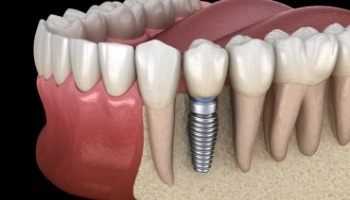
We can fill in the gap in your smile using a single titanium dental implant post. Combined with a metal abutment and a customized dental crown, you will find that speaking and eating become much easier.
Missing Multiple Teeth
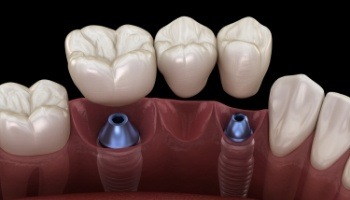
When multiple missing teeth cause you to shy away from social gatherings, trust us to place two dental implants into the exterior sockets while also placing a customized dental bridge that is secured to the top. In no time at all, you’ll be enjoying greater functionality that doesn’t require altering healthy teeth.
Missing All of Your Teeth
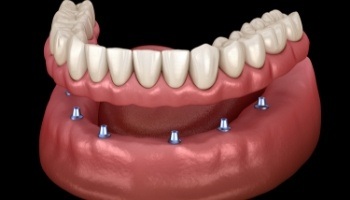
Traditional dentures no longer have to be your only option when faced with a mouth full of missing teeth. Instead, you can opt to have between four and six dental implant posts placed along the gumline before a customized denture is placed on top.
Understanding the Cost of Dental Implants

Your dental implant treatment will not cost the same as another patient’s tooth replacement. The reason is that there are many factors that Dr. Bemani must consider before drafting your cost estimate. You can feel less anxious, however, in knowing that many dental insurance companies are now beginning to offer coverage for this type of service. But if yours does not, our team will work to find ways to help lower your out-of-pocket expenses, two of which are flexible financing as well as our in-house membership plan. To learn more about what to expect, simply keep reading!
Preliminary Treatments & Dental Implant Surgery

In certain cases, patients may need preliminary procedures to ensure the successful integration of dental implants with the jawbone and their stable placement within the oral cavity. These preparatory treatments, such as gum disease treatment, tooth extractions, bone grafting, or a sinus lift, may incur additional costs for dental implants in Catonsville.
Once your mouth is ready to support the implants, you will schedule the surgery with a trusted local specialist. Keep in mind that this comes with its own associated cost, so be sure to reach out to them for separate billing information.
The Parts of Your Dental Implant

Several factors can influence the overall treatment cost, including:
- Number of Implants: The quantity of dental implants needed varies based on the number of missing teeth, ranging from one to six implants for each arch.
- Type of Restoration: The type of restoration required impacts cost. A single missing tooth may only need a crown, which is typically less expensive than a dental bridge or denture used to restore multiple or an entire arch of teeth.
- Implant Material: Implants can be crafted from zirconia or titanium, and the choice of material can affect the overall cost.
- Manufacturer Options: Patients can select from various implant manufacturers recommended by our team. If you have questions about the quality of the brands we use in our practice, feel free to inquire.
How Dental Implants Pay for Themselves

Opting for traditional dentures or bridges might seem like a cost-effective choice, but dental implants can prove to be a more economical investment in the long run. Unlike dentures and bridges that may require replacement every 5 to 10 years, dental implants have a longer lifespan. Additionally, there's no need to purchase special solutions for maintenance. Their ease of care can help prevent gum disease, tooth decay, and other oral health issues, ultimately saving you from the expenses of extensive dental care.
Does My Dental Insurance Cover Dental Implants?

Although the majority of dental insurance plans typically do not fully cover the expenses of dental implants, certain plans may extend benefits for specific components of the treatment, such as necessary preliminary procedures and the restoration costs. If you have any questions regarding your coverage, feel free to reach out to our office. Our financial team is available to assist you in understanding any potential out-of-pocket costs you might be responsible for.
Making Dental Implants Affordable

Don’t have dental insurance? No problem! We can help you apply for CareCredit financing to support your payment for dental implants. With CareCredit, you have the flexibility to pay for your dental care through convenient monthly installments, eliminating the need for a lump-sum payment. CareCredit plans typically feature minimal to zero interest, providing you with a worry-free financial option.
Dental Implant FAQs

Dental implants in Catonsville are a trusted tooth replacement method. However, they are a lifelong commitment. Don’t worry if you have some concerns because Dr. Maryam Bemani will explain everything during your implant consultation. You can also take a look below at the answers to the most frequently asked questions about dental implants. Can’t find what you’re looking for? Contact our office to speak with a member of our team. We’re more than happy to answer any questions.
Can I Take Dental Implants Out?
A dental implant differs from any other treatment because it replaces both the tooth root and the crown. The post is surgically placed into your jawbone to act as a new root. Your bone will fuse to it through a process called osseointegration. Therefore, you can’t remove your post, but some implant dentures can be taken out for easy cleaning. Only a trained dental professional can remove dental implants, such as in cases of failure.
Does Getting Dental Implants Hurt?
Your implant dentist in Catonsville will keep your comfort a priority. Sedation or anesthesia will be used to block any pain during your placement surgery. After the effects of any medications dissipate, you can expect some tenderness, swelling, and bruising for a few days. You can manage it with a prescribed or OTC pain reliever. Apply cold compresses to reduce pain, swelling, and bruising. Your dentist will review your aftercare instructions before you go home, like eating soft foods.
Are Dental Implants Successful?
Dental implants are proven to last for 30 years or more, with over a 95% success rate. Many factors affect the long-term success of your new smile, like your oral hygiene habits. Commit to brushing your teeth at least twice daily and floss every night. Break any bad habits that might damage your implants, like crunching ice or chewing on your fingernails. Commit to visiting your dentist every 6 months for a cleaning and checkup. They’ll help you get the most from your investment.
What are the Signs of Dental Implant Failure?
The risk of dental implant failure is less than 5%, but complications can occur. A leading cause is an infection called peri-implantitis. It’s like gum disease, which is caused by bacteria in plaque and tartar buildup. Inflammation, bleeding, and redness near the implant are the early signs of an infection. Contact your dentist right away for an appointment.
What Should I Do If My Implant is Loose?
After your jawbone heals, your implant should never feel loose. It may be caused by a damaged restoration, but it can also be the result of bone loss or an infection. Don’t wait to contact your dentist if your dental implant doesn’t feel stable.
